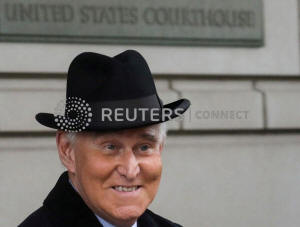U.S. judge seems skeptical about giving Trump adviser Stone a new trial
 Send a link to a friend
Send a link to a friend
 [February 26, 2020]
By Sarah N. Lynch [February 26, 2020]
By Sarah N. Lynch
WASHINGTON (Reuters) - A U.S. judge on
Tuesday signaled skepticism toward a bid by Roger Stone, a longtime
adviser to President Donald Trump, to win a new trial based on claims
that the jury forewoman was biased, even as Trump assailed her again on
Twitter.
Stone, a veteran Republican operative, was convicted by a jury in
November of lying to Congress, obstruction and witness tampering
U.S. District Court Judge Amy Berman Jackson, who on Thursday sentenced
Stone to three years and four months in prison, called two jury members
and the forewoman accused by Stone of bias to the witness stand to
testify in a hearing that lasted more than four hours.
Stone's attorney Seth Ginsberg questioned the forewoman about comments
she posted on social media, her answers to a jury selection
questionnaire and about whether she read media coverage of the case
during the trial.
One of her social media posts before the case began linked to an article
that referenced Stone’s arrest last year, and the juror wrote, “Brought
to you by the lock her up peanut gallery,” referring to “lock her up”
chants by Trump supporters in 2016 about his Democratic election
opponent, Hillary Clinton.

Most of her posts cited by Stone's lawyers were not about the Stone case
but related to Trump policies or Special Counsel Robert Mueller's
investigation into Russian interference in the 2016 election.
She also sent some tweets on days when the trial occurred but none
related to the case.
Jackson did not rule on the motion for a new trial on Tuesday, but she
repeatedly cast doubt on Ginsberg's claims that the forewoman's views
about the president implied bias against Stone in a criminal trial.
"Having an opinion about the president and some or even all of his
policies does not mean that she couldn't fairly or impartially judge the
evidence against Roger Stone," Jackson interjected at one point.
The judge said the identities of the jurors who testified should not be
made public to protect their safety. She emptied the courtroom, did not
refer to them by name or juror number and limited media to listening to
audio of the hearing.
A male and a female juror testified that the forewoman never discussed
politics or media articles about the case during deliberations and said
she acted appropriately at all times.
[to top of second column]
|

Former Trump adviser Roger Stone departs after he was sentenced to
three years and four months in prison for charges that include lying
to Congress, obstruction of justice and witness tampering, at U.S.
District Court in Washington, U.S., February 20, 2020. REUTERS/Leah
Millis/File Photo

"You don't have any facts she was reading things she wasn't supposed
to read during the trial?" Jackson asked Ginsberg at one point, to
which Ginsberg conceded he lacked any such direct evidence.
Trump has said the jury forewoman was "tainted," accusing her of
being an "anti-Trump activist." The Republican president also has
attacked the original prosecutors in the case and Jackson herself.
Jackson condemned Trump's comments at the hearing, saying they
helped fuel threats against the jury, violated their privacy and
could deter others from wanting to serve as jurors.
"This is a highly publicized case and in a highly polarized
political environment in which the president himself has shone a
spotlight on the jury," Jackson said, adding that the jurors who
testified faced an "extremely high" risk of harassment.
But Trump attacked the forewoman again during the hearing on
Tuesday, writing on Twitter she "was totally biased, as is the
judge."
Trump's latest Twitter comments came two weeks after U.S. Attorney
General William Barr, his own appointee, rebuked the president for
prior remarks about the case including assailing the prosecutors for
a "miscarriage of justice" after they urged Jackson to sentence
Stone to seven to nine years in prison.
The four prosecutors quit the case after Barr and senior Justice
Department officials retracted the sentencing recommendation in the
wake of Trump's criticism.
The charges against Stone stemmed from Mueller's investigation that
detailed Russian meddling in the 2016 election to boost Trump's
candidacy. Stone was accused of lying to U.S. lawmakers
investigating the Russia election interference.

(Reporting by Sarah N. Lynch; Editing by Andy Sullivan, Will Dunham
and Cynthia Osterman)
[© 2020 Thomson Reuters. All rights
reserved.] Copyright 2020 Reuters. All rights reserved. This material may not be published,
broadcast, rewritten or redistributed.
Thompson Reuters is solely responsible for this content. |